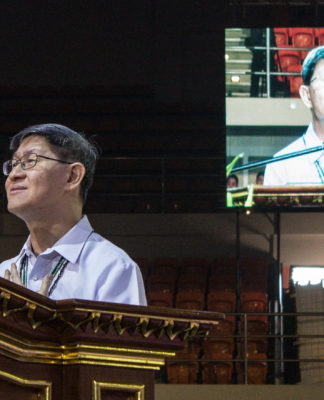 For the Philippines to regain its spot in the world academic map, colleges and universities must pursue genuine cooperation.
For the Philippines to regain its spot in the world academic map, colleges and universities must pursue genuine cooperation.
Months ago in coverage of an international forum of Asian students and educators, I had the opportunity to talk to Thai students about the state of tertiary education in both Thailand and the Philippines.
Waithathorn, a banking and finance student from Chulalongkorn University in Bangkok, said higher education in his home country is very competitive; with their diplomas, students land a good job not only in Thailand, but also in the global professional arena.
He attributes the good quality education in Thailand to cooperation among universities.
He gave me success stories of what once an academically deprived nation. The turn of the 21st century, the student said, saw great innovations in the educational system in one of the Philippines’ neighbor countries.
One of the innovations was the genuine cooperation among schools, especially the universities. In Thailand, Wai recounted, professors impart their knowledge and expertise on their university’s flagship courses with other universities. Though it is not mandated by the Thai government for teachers to lecture in other schools and teach other students, it has become a good practice in Thailand. And it has resulted into good outcomes.
Thai students belonging to different universities cooperate with one another and don’t let school spirit stop them from fruitful changes.
This is the spirit of real cooperation that the Filipino higher education system must observe. What we need is a paradigm shift that would lift the ailing tertiary education in our country. In Thailand, Chulalongkorn sends professors to nearby universities to teach their flagship course, which is medicine. In exchange, Thammasat University, also located in metropolitan Bangkok, sends their professors to Chulalongkorn to teach the humanities and social sciences, its strong suits. Other universities follow this scheme, and surprisingly, students are engrossed with the teaching style.
No wonder, in the recent rankings of Asian universities by London-based consultancy Quacquarelli-Symonds (QS), 11 Thai universities made the cut in the top 200 listings, compared to the dismal four of the Philippines.
I was humbled when the student from Chulalongkorn—a world renowned university in public health and medical research—chided me with the shortcomings of Philippine education.
“The problem [with] you Filipinos is that, you always think that you are the best. Your pride is very high,” the student said. It is unbelievable to hear the perspective of a non-Filipino student, but nevertheless, he was absolutely correct in his argument.
The Philippines, according to him, was once envied by Thailand in the 1960s or ‘70’s because of its globally competitive academic reputation. According to his professor, the Philippines served as Thailand’s benchmark in initiating educational policy reforms in his home country.
What has happened to our educational system? It has gone down under.
Perhaps because Filipinos are forever in search of identity, young Filipinos assume the identity of their schools, because the top universities are also elitist (and these include state universities funded by Filipino taxpayers), young Filipinos assume an elitist identity, too.
We young people must mature and carry one authentic sense of cooperation.
University administrators, on the other hand, look at Thailand and its reformed education systems. It’s time that we need a benchmark that would let the country regain its academic reputation.
“I know the Philippines will be back soon in the educational map. Just do your part, friend,” said my Thai friend.

















I agree with everything you included here especially that part “The problem [with] you Filipinos is that, you always think that you are the best. Your pride is very high.” So true. For example, most of us are always getting butthurt at the slightest joke, especially one cracked by a foreigner, and we’re so fast to regard it as ‘racist.’ When are we going to stop our delusions of being a super race? We can’t even figure out what defines a Filipino identity. I say it’s high time for us to get real!